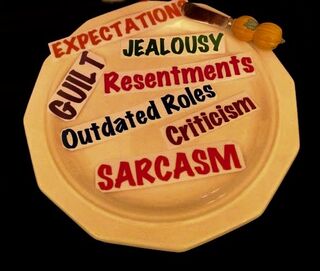President Donald Trump
When Politics Divides Your Holiday Dinner Table
Functional phrases trump discussion if Trump crashes your gatherings.
Posted November 15, 2022 Reviewed by Abigail Fagan
Key points
- Frustrating moments at gatherings often stem from groupthink or problematic character traits.
- Reflective listening and finding agreement can shift the situation from a negative spiral to an upbeat, positive one.
- When your gathering includes children, have calm distractions on hand like crayons, mandala coloring pages, and books.
- Cognitive dissonance takes time as people reckon with any misinformation or their own faulty thinking.
He’s back. Just like indigestion after a large meal, the topic — and what if’s we therapists help clients navigate — has returned. If we let it. And how key that is.
We had a bit of a lull in roughly eight years of stark lines drawn within families due to the unprecedented way a presidential candidate behaved toward others. The Trump phenomenon, no matter which side, has crashed into more than a few gatherings, yet we can all phrase our words to trump — mitigate at the very least — the effects.
It strikes not only at Thanksgiving, Hanukkah and Christmas, but during vacation season, too. “We’d love to go to the cottage to ski (or beach house) this year,” a typical client may divulge, “…but my brother-in-law backs the rioters and challenges my cousins who work in healthcare. Imagine how that goes.”
It affects our collective mental health and frequently becomes the topic in therapy. What if she says this or he brings up that? How do we get our relatives to mask around our newborn or take a stand that we won’t be there otherwise?

This is the fodder that invites foolishness or strengthens families, perhaps even nudging them more toward functional than dysfunctional.
When I drafted Overcoming Passive Aggression, I purposely inserted a chart in the family/friends chapter where frustration often stems from a lack of differentiation or emotionally being stuck in one's family of origin stronghold. Sure, dysfunctional habits may also tip us off to difficult character traits. I'll share a few from the book's larger list.
Flexible vs. Rigid Thinking
"You ought to live a little, get out and go places," Uncle Joe might boast. "Those drug companies are just takin' us for a ride to line their pockets."
There's a healthier habit than reaching for more wine. Breathe. Think: How can I agree with some tiny morsel here, even if it's half a roasted chestnut size? Say: "We must be vigilant for our kids who rely upon our decision making, but Uncle Joe, I'm really glad you're out there having fun. What are the top two places you've visited this year?"
Ground You've Gained: You've taken a stand, embraced agreement, sidelined the should-must-ought-to mandates, and flexed some mental curiosity as you honor Uncle Joe's feelings about getting out and about. It uses the proverbial "tell me more about that," and most everyone likes to share what they enjoy. Just shift it more positive.
Stretch and Roll
No, this doesn't have you grabbing yoga mats, though that's not a bad idea for your digestion. It signifies purposeful shifts in body language, which sends half the message with whatever escapes a person's lips.
If Uncle Joe slammed his fist onto the table with his advice, we'd see it more as a demand than a suggestion, right? Heavy sighs, crossed arms or legs, a tight jaw line, glare or rolled eyes multiply tension. Instead, stretch your arms above your head or if you really must divert topics, stand up.
"I'm getting rather stiff from all this sitting," you might say as you rise from the table. Stay focused on the speaker as you signal your intention to stretch or clear the dishes. The shift in posture and position may recalibrate things. Smile — a relaxed one, not angry — and use I-messages because starting with you or asking why (or why don't you) kicks in defenses.
Ground You've Gained: You model movement, relaxed and natural, and your actions may encourage others to follow your lead. With people moving about and dishes disappearing there's a shift in energy, even if Uncle Joe stays on topic.
Control What You Can and Let the Rest Go
"He's a better leader than what we've got now," utters the civic-minded or politically-obsessed guest. Take your pick on that label, but keep labels to yourself indeed.
Cognitive dissonance, as I wrote about here, may also set in when people's views shock us. If others reckon with misinformation or faulty thinking, this process does take time.
Take the table temperature. If there's nothing you can say that will persuade people to open their minds to possibilities, then do something different and let that expectation go. This will actually energize rather than drain you.
The exception is children who benefit from discipline, not punishment, as you teach the opposite of the poor behavior displayed. Distract and calm a child to encourage emotional regulation with crayons, paper, mandala coloring books, or even this great children's book, My Day Is Ruined! A Story Teaching Flexible Thinking, by Bryan Smith and Lisa Griffin.
Ground You've Gained: You model calm and discourage power struggles where nothing’s gained. Additionally, you help children gain understanding since they benefit from immediate consequences that are meted out with fun and distraction (coloring, reading) rather than "wait till we get home" threats.
© Copyright 2022 by Loriann Oberlin. All rights reserved.
References
Overcoming Passive Aggression: How to Stop Hidden Anger from Spoiling Your Relationships, Career, and Happiness by Tim Murphy, Ph.D. and Loriann Oberlin, MS, LCPC (DaCapo Lifelong Books, 2016)
My Day Is Ruined: A Story for Teaching Flexible Thinking by Bryan Smith and Lisa Griffin (Boys Town Press, 2016)




